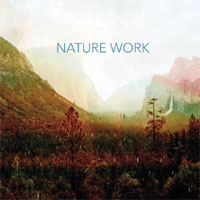Jason Stein, Greg Ward, Eric Revis, Jim Black • Nature Work
 hicago improvisers are hardcore internationalists, who for years
had closer ties with musicians from, say, Wuppertal or Stockholm than New York or Los
Angeles. Nowadays there’s more outreach to the coasts. One Chicagoan doing his bit is
Jason Stein, the rare musician to play bass clarinet exclusively. (Even dedicated growlers
like Rudi Mahall and Lori Freedman pick up the regular clarinet on occasion.) Stein had
tapped New York drummer Tom Rainey for a contrapuntal two-reeds quartet on 2017’s Lucille!
For Nature Work Stein drafts New York drummer Jim Black and LA-reared Eric Revis,
Branford Marsalis’s longtime bassist who moonlights with outcasts like Andrew
Cyrille, Kris Davis and Chicago’s Ken Vandermark. The format is again a two-reeds,
two-rhythm quartet, but here the interplay is looser, more chatty. hicago improvisers are hardcore internationalists, who for years
had closer ties with musicians from, say, Wuppertal or Stockholm than New York or Los
Angeles. Nowadays there’s more outreach to the coasts. One Chicagoan doing his bit is
Jason Stein, the rare musician to play bass clarinet exclusively. (Even dedicated growlers
like Rudi Mahall and Lori Freedman pick up the regular clarinet on occasion.) Stein had
tapped New York drummer Tom Rainey for a contrapuntal two-reeds quartet on 2017’s Lucille!
For Nature Work Stein drafts New York drummer Jim Black and LA-reared Eric Revis,
Branford Marsalis’s longtime bassist who moonlights with outcasts like Andrew
Cyrille, Kris Davis and Chicago’s Ken Vandermark. The format is again a two-reeds,
two-rhythm quartet, but here the interplay is looser, more chatty.
On alto saxophone is a Chicagoan who’s spent years in New York, Greg Ward, whose fleet, pliable sound flies back to Charlie Parker’s birdcalls. His sound has bite that he doesn’t overstress (overbite?), and his lean bright sound contrasts with Stein’s woody timbre and bubblier attack. On the heads the horns may rub together with friction ("Zenith"), or blend smoothly when Stein dips into the big horn’s hollow-pipe sonority. At heart bass clarinet is a jumpy axe, eager to leap into thick squealing overtones that players exploit, like it or not. Stein has mastered those rude split-tones, can play whole melodies up there, without sacrificing their jungle-beast quality. Like others he’ll careen quickly between high and low extremes, if only to demonstrate that the bass clarinet’s range exceeds that of its more dashing cousin, the tenor saxophone. A tough rhythm section keeps up. Jim Black always hits snare drum like he means business, and has a persuasive groove, rocking in jazz contexts. He and Revis hook up very well, playing on top of each other for "The Shiver"’s flag-waver melody and then open up for the blowing, where the bassist supplies momentum rather like classic Charlie Haden, without evoking Charlie’s signature rubber tone; he’s not paying homage, just building on what came before. (The mix emphasizes the bass’s low throb, not the plucked prow of the note.) On "Tah Dazzle," bass and drums zero in on soloist Ward’s rhythmic phrasing like it’s a big, fat target; all four musicians dance to a syncopated beat. On "Cryptic Ripple," the horns leapfrog, 16 bars at a time, over a tick-tock of snare and vamping bass, a pounding pattern Black and Revis complicate in all kinds of ways, on the fly, passing the beat like a ball. "Rise" has more of the rhythm section’s backbeat insistence, but here the longish solos counteract the rockish economy -- not that there aren’t too-long rock solos. The tracks are mostly around six or seven minutes, where once or twice a couple minutes shorter would do. But sometimes it pays to let them take their time. "Opter Fopter" starts with a couple of minutes of shiny atmospherics, just long enough. When Black goes into quiet time-playing, reeds and bass unreel a blissfully coherent free improvisation for 45 seconds before that episode begins to dissipate. Only around four minutes in does Ward’s theme emerge -- a plaintive long-note melody recalling Tim Berne’s elegant snakes, a simple hooky line that sticks in your head like it’s supposed to. There’s more spacious free-play that keeps moving early on Stein’s "Porch Time," whose melody unwinds from and curls back toward a spinning-top rhythmic figure: one more treat for bass and drums, to keep momentum going under the solos. Chicago trombonist Nick Broste ably recorded the one-day
session. There is just enough room sound so the music doesn’t sound airless, and he
gets a good lively drum sound: hear the top of "Zenith." |
